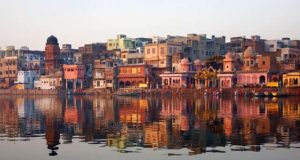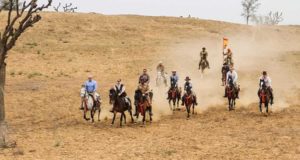Famous Muslim Festivals and Ceremonies in Kerala
Kerala is a real example of Indiaâs secularism where every festival originated from assorted religions is celebrated with equal enthusiasms. The Muslim festivals in Kerala are Id-ul-Fitr, Bakrid, Miladi Sherif, Chandanakudam Mahotsavam, and Kondotty Nercha.
Eid-ul-Fitr

Ramzan is the ninth month of the lunar year. Eid-ul-Fitr festivals is celebrated after the conclusion of the Ramzan, the month of fasting when Muslims abstain from food and drink during the day and spend time in prayer for the purification of body and soul. Sighting of the crescent moon on the western horizon signifies the onset of the festival. It begins with distribution of food to the poor. This festival in Kerala is celebrated with joy and enthusiasm by Muslims all over the state.
Bakrid

The Bakrid or Id-Ul- Zuha (also known as Valiya Perunnal in Malayalam) is a festival of sacrifice, celebrated to commemorate Abraham’s willingness to offer his only as a sacrifice at God’s command. Since, then a sheep or a bakri is sacrificed in the name of Allah. On Bakrid, people dressed in their best clothes proceed to Idgah, which is the wide open space set apart for public prayers held under the leadership of Imam. At homes, ceremonial prayers and sumptuous feasts form an important part of the Muslims. On this day of Bakrid, the rich sacrifice the goats or other animals and distribute the flesh to the needy. These acts are to ensure that all Muslims of Kerala irrespective of whether they are rich or poor have a good meal at least on these days.
Miladi Sherif – Muslim Festival in Kerala
This Muslim festival commemorates the birth of Prophet Mohammed. Reading a short biography of the Prophet Mohammed written both in verse and prose in Arabic has been a traditional ritual of Miladi Sherif Kerala. Night lectures are organized during the first 12 days of the month. In the Month of Rabi-ul-Awwal, Moulood is conducted by the orthodox Muslims of Kerala. Moulood are actually hymns in praise of Prophet Mohammed and are composed in highly poetic prose. Nowadays, in this month Miladi Sherif Kerala is observed by organizing public meetings instead of Moulood festivals.
Chandanakudam Mahotsavam
The holy shrine of Beema Beevi popularly known as Beempalli is situated in the southwest of Thiruvananthapuram on the beach road. Beemapalli is a shrine dedicated to the memory of Beema Beevi a devout pilgrim who came to Kerala from Mecca. The Chandanakudam at Beema Palli near Thiruvananthapuram is a colorful Muslim festival in Kerala. Festivities last for 10 days. This Mahotsavam is said to be the death anniversary of Beema Beevi. Pilgrims of all ages, irrespective of faith, can be seen at the shrine during this Muslim festival in Kerala. The pilgrims bring pots (kudams) filled with coins as offerings. These pots are coated with sandalwood paste (Chandanam), hence the name Chandanakudam exists.
Kondotty Nercha

This Nercha, conducted at Pazhayangadi Mosque, constructed in the 18th century attracts thousands of devotees. The three day long Valia Nercha feast is the biggest Muslim Festival in Kerala. The tomb of Mohammed Shah-the Sufi exponent, is close to the mosque and is constructed in Mughal style.
The Muslims of Kerala do not attach much importance to the Muharram festival. However, the Rowther (Tamil-speaking Muslim) celebrate the day with all pomp and show. Eid and Bakrid- Ramzan Perunal and Hajju Perunal are the most important Muslim Festivals all over the world. All male Muslims of Kerala go to the Mosque early in the morning on both these days and offer collective prayers. Though not common, Muslim women also attend mosques in many places to offer Eid and Bakrid prayers. On the night before the Eid, rice or wheat is distributed among the poor; this is known as Fitr Zakat. On this day of Bakrid, the rich sacrifice the goats or other animals and distribute the flesh to the needy. These acts are to ensure that all Muslims of Kerala irrespective of whether they are rich or poor have a good meal at least on these days.
In the Month of Rabi-ul-Awwal, Moulood is conducted by the orthodox Muslims of Kerala. Moulood are actually hymns in praise of Prophet Mohammed and are composed in highly poetic prose. Nowadays, in this month Miladi Sherif is observed by organizing public meetings instead of Moulood festivals.
Inheriting Hindu customs, the Muslims also hold certain Muslim Festivals in their Mosque. The Theruvathu Mosque of Alathur Taluk celebrates a grand festival every year, just like the temple festivals. People from all communities and from the neighboring districts in Tamil Nadu also take part in the festival. There is jaram, or tomb, in the mosque, which is said to contain the remains of a learned Sheik. The rites observed here are almost analogous to the rituals of the temple.
Urus festivals, celebrated in many mosques, are spread out over many days. Prayers and offerings are regularly offered by many at the tombs of pious saints and philosophers.


